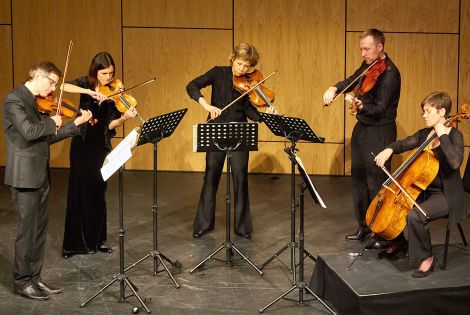Reviews / Scottish Ensemble: Carnegie Hall next
The Scottish Ensemble returned to the Mareel Auditorium on Friday night to bring us the second of their three shows in the 2015/16 Shetland Season, writes Alex Garrick-Wright.
Jonathan Morton, Scottish Ensemble’s Artistic Director and violinist, explained to the non-music buffs that their two-viola quintet was fairly unusual, and should hopefully add a different spin on the two more famous pieces they had in store. He introduced their first pieces, Mozart’s String Quintet No. 4 in G Minor (k516), an “anguished” piece written when the composer was 31, just four years before his death.
Mozart’s piece was up and down, dramatic and slow in places, playful and energetic in others, all the time with a wistful underlying quality. The second movement, particularly, was quite relaxing, until sudden angry flashes of strings jolted the listener back from their false sense of security.
By the fourth movement the ‘up-and-down’ seemed to have gone, replaced with ‘down’. At one incredible point it sounded like the instruments were crying, a beautiful if very melancholy display of musical prowess on the part of the players.
For some reason known only to Mozart himself, the tone completely changes during the last movement, becoming perky and upbeat until the very end. Given the sorrowful atmosphere of the rest of the piece, this “throwaway brilliance” (as Morton put it) felt like it was from a different composition. Imagine if Requiem for a Dream ended with everyone winning the lottery and riding off into the sunset, rich and happy. Very nice, but an odd stylistic choice on Mozart’s part.
The second piece, Nocturne by contemporary Glaswegian composer Martin Suckling, was a very, very different beast. Just two of them this time – violin and cello, with Morton explaining that Martin Suckling was a great fan of finding “the notes between the keys of a piano” – that is, the unconventional, dissonant ones.
Become a member of Shetland News
It would be perfectly legitimate to question quite why, for a concert ostensibly about quintets, called Quintets, that they decided to put a duo as the second of the three pieces; no explanation was forthcoming.
The music – or “shadowy shards of sound”- was extremely eerie, aided by the lights being dimmed to near-darkness. Morton managed to produce a feedback-sort of quality from his violin, bizarre electronic noises from a thing of catgut and wood.
Intended as a “palate cleanser” it certainly did its job. However, while interesting, and undoubtedly of great artistic merit, the question remains of whether this piece was actually enjoyable.
Musicians in the audience would certainly appreciate the technical skill required to produce feedback and birdsong from a violin, and the experimental quality of the whole endeavour; but whether most of the audience would choose to ever listen to it again is less certain.
It was like walking through an art gallery – the Mozart and Brahms wings, full of very nice landscapes and portraits full of colour and life, being separated by an exhibition of ultra-abstract interpretive dance. It may deserve to be there just as much as the other two, but you probably wouldn’t buy the DVD of it at the gift shop afterwards.
Following swiftly on from Nocturne – so swiftly that there was no introduction, in fact – was Brahms’ String Quintet No 2 in G Major (Op.111). The contrast between the two was as marked as a warm, lazy summer morning following a night of harrowed insomnia.
Considerably more chipper and hopeful, Brahms was the perfect way to finish off the concert. Rich and sumptuous, every note washed over the enraptured audience – so enraptured, in fact, that they spontaneously burst into applause at the end of the first movement, a little burst of unbridled appreciation for some truly stunning music.
Brahms’ piece ends with an explosive climax, the culmination of over two hours’ of perfect playing. There’s actually very little to say about these world-class performers, other than ‘flawless’. Not a note missed, not one player out of time by a half-second, not the slightest hesitancy or wobble or slip. The kind of flawless only possible from true talent at the top of their game.
This is the kind of talent that normally skips over places like Shetland. The Scottish Ensemble are good enough to play Carnegie Hall in New York; during this summer’s residency they’ll be playing Carnegie Hall in Sandwick. They’re back in April thanks to sponsors inksters Solicitors – go buy a ticket now. If you have even a passing interest in music, you have to see them. Have to.
Become a member of Shetland News
Shetland News is asking its many readers to consider paying for membership to get additional features and services: -
- Remove non-local ads;
- Bookmark posts to read later;
- Exclusive curated weekly newsletter;
- Hide membership messages;
- Comments open for discussion.
If you appreciate what we do and feel strongly about impartial local journalism, then please become a member of Shetland News by either making a single payment, or setting up a monthly, quarterly or yearly subscription.




































































